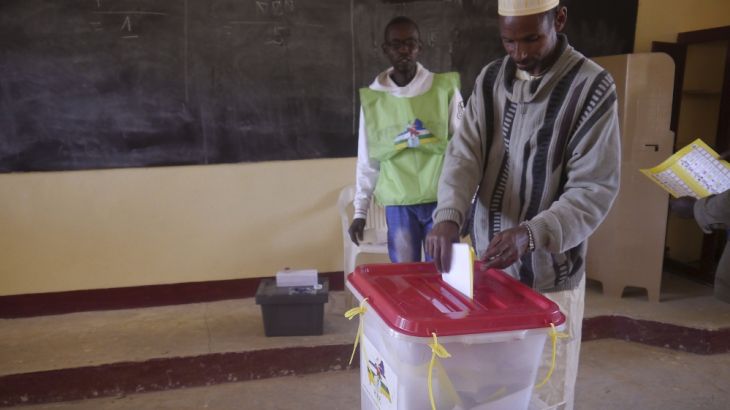Hopes for peace as CAR holds long-delayed election
Thirty candidates vying for presidency in election that will test progress towards stability after years of violence.

Voting got off to a slow start in key presidential and parliamentary elections in the Central African Republic, which people hope will usher in stability after years of bloodshed.
Snaking queues had formed outside polling stations in the capital Bangui early on Wednesday morning, but many of them had yet to open two hours later.
Among the areas affected by the delays was the flashpoint PK-5 district of the capital Bangui, where ballot papers and voters’ lists had yet to arrive at some polling stations.
The presidential and parliamentary vote has been delayed several times, with the latest date set for December 27 pushed back again by three days to allow officials deal with technical and organisational difficulties.
“This time, everything will be fine throughout Central African Republic,” said Julius Rufin Ngoadebaba, spokesman for the National Electoral Authority, rejecting allegations that illegal voter cards had been distributed.
READ MORE: Everything you need to know about elections in CAR
Thirty candidates are competing for the presidency, with some of the frontrunners including former prime ministers Martin Ziguele and Anicet Georges Dologuele.
Other top candidates include a former foreign minister, Karim Meckassoua, and Bilal Desire Nzanga-Kolingba, who is the son of a former president.
More than 1.8 million people are expected to vote, at more than 500 polling stations across the country, which has been ruled since May 2014 by interim President Catherine Samba-Panza.
CAR has been rocked by violence since March 2013 when a largely Muslim alliance of rebel groups known as the Seleka overthrew President Francois Bozize.
| CAR: From 2013 coup to key poll |
|
– March 2013: The fall of Bozize A day later, Seleka leader Michel Djotodia suspends the constitution and says he will rule by decree until elections are held, becoming the first Muslim president of the predominantly Christian country. – December 2013: France intervene s – January 2014: Djotodia quits – September 2014: UN replaces African force – January 2015: UN probe – December 2015: Constitutionalreferendum and new elections (Timeline by AFP) |
When a Seleka leader left power under intense international pressure in 2014, a swift backlash by the Christian anti-Balaka groups against Muslim civilians followed.
Religious violence has continued ever since, displacing nearly one million people.
Q&A: Is CAR ready to hold a free and fair election?
“I’m pleased Bozize is gone, now we need a president that can allow our country to re-find its place,” Igor Brice Yandia, an ex-Seleka fighter told Al Jazeera from Bria, the heart of the Seleka rebellion and one of the poorest parts of the country.
“That’s why I put down my weapon to go to work and to show others it can be done.”
Election hopes
CAR approved a new constitution after a referendum on December 13, a vote seen as a test for Wednesday’s elections.
“We are ready and determined to go ahead with the vote of December 30, because it is time our country comes out of this long crisis, recovers its institutions and that Central Africans find reconciliation and live together,” Mireille Djapou, a 26-year-old student, told the AP news agency.
In the capital Bangui, many people said they were desperate to vote and that they hoped the election would bring change to the country.
READ MORE: Bloodshed has clotted but wounds still ache
Gbenda Jocelyne, 37, said: “The campaign has gone well. The situation in our country is difficult. There are always problems but we will vote for a new president to bring back security.”
Crucial to the success of the election will be maintaining security and the 11,000-strong United Nations peacekeeping mission, MINUSCA, has promised a heavy security presence.
UN Secretary General Ban Ki-moon on Tuesday called on politicians to resolve disputes that may arise from the elections through legal and peaceful means.
He pointed to the 1.8 million people on the voting rolls as a “clear demonstration of the population’s engagement to exercise their democratic franchise” and urged “all national stakeholders to commit themselves to ensuring that the elections are conducted in a peaceful and credible manner”.
